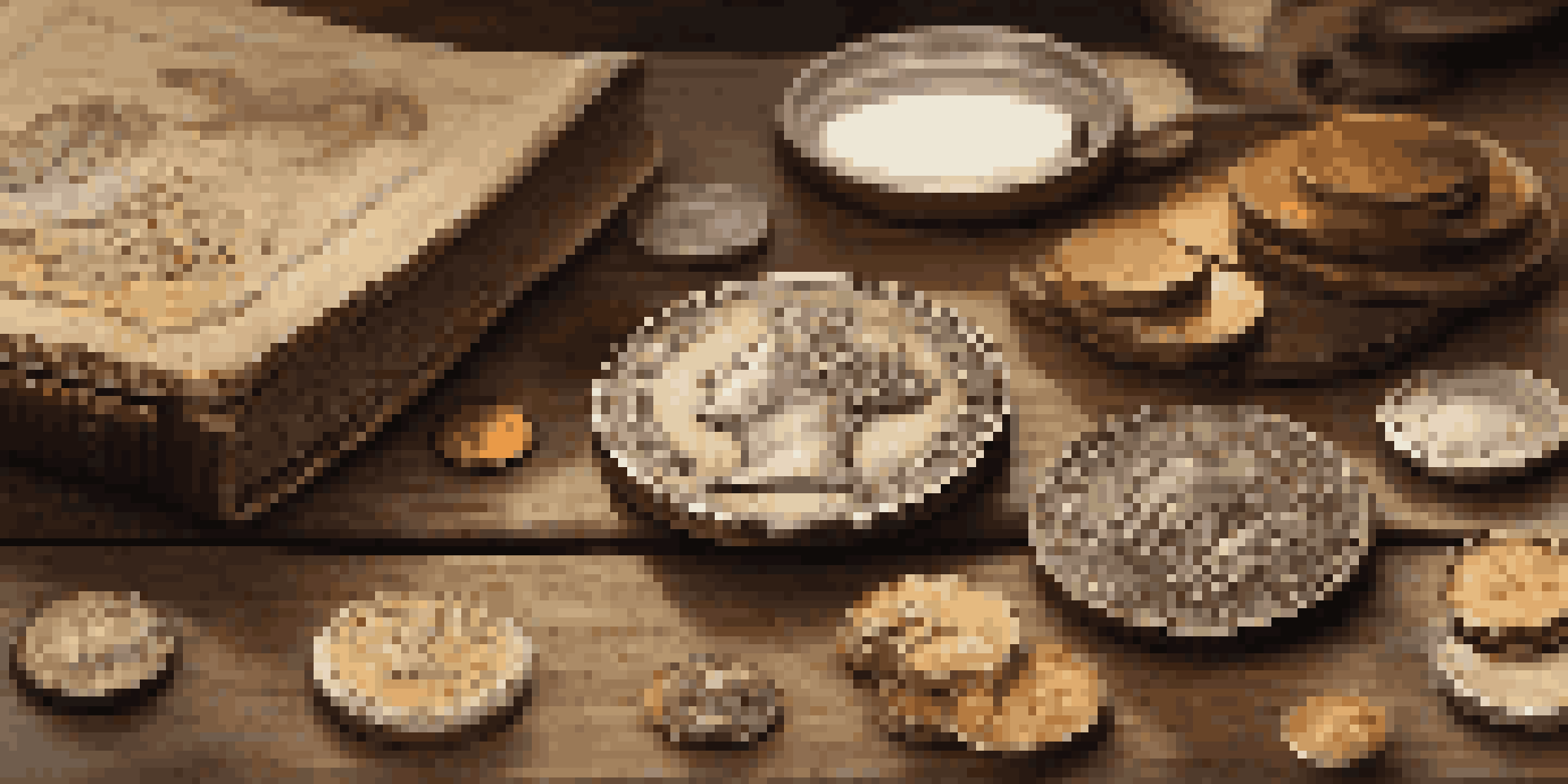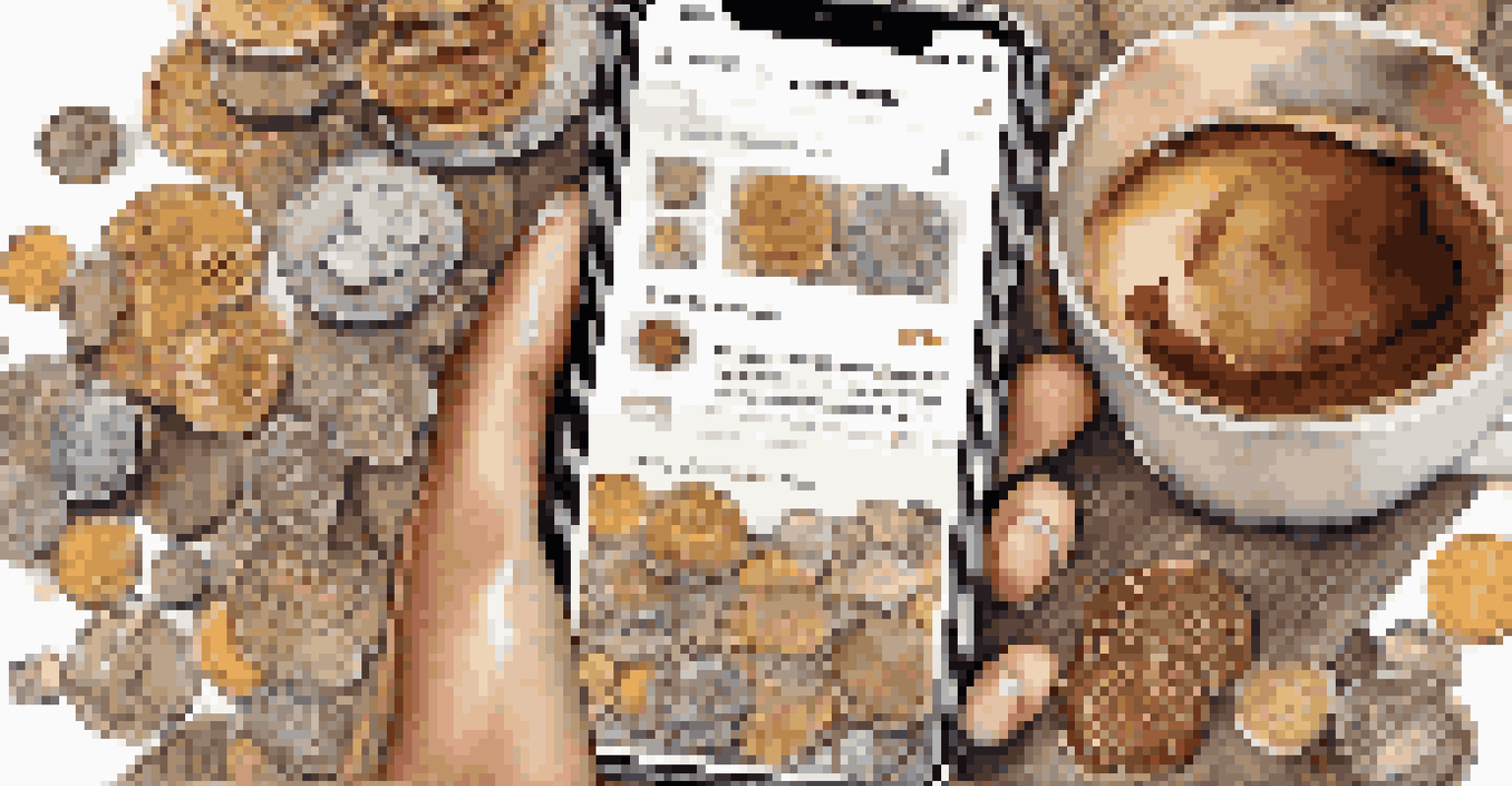How to Research Coins and Their Historical Significance

Understanding the Basics of Coin Research
Before diving into any research, it's crucial to understand what you're looking for. Coin research is not just about identifying a coin's value; it's also about uncovering its story. Each coin has a history that reflects the culture and economy of its time.
Coins are the most tangible connection we have to our past. They tell stories that history books cannot.
Start by familiarizing yourself with terminology related to coins, such as 'minting,' 'denomination,' and 'numismatics.' Numismatics is the study of currency, including coins, paper money, and tokens. Knowing these terms will help you navigate your research more effectively.
With this foundational knowledge, you're better equipped to explore various resources that can provide valuable insights into the coins you're interested in. Let's move into the types of resources available for your research.
Utilizing Online Databases for Coin Research
The internet is a treasure trove of information for coin enthusiasts. Online databases and numismatic websites, such as the American Numismatic Association or Numismatic Guaranty Corporation, offer detailed information about coins, including images, historical context, and market values.

These platforms often provide forums where collectors can share knowledge and experiences. Engaging with these communities can lead to valuable insights, tips, and even connections for future trades or purchases.
Explore Diverse Research Resources
Utilize online databases, books, museums, and local clubs to enrich your coin research.
Don’t forget to verify the credibility of your online sources. Cross-referencing information from multiple reputable sites ensures that the data you gather is accurate and trustworthy.
Exploring Books and Publications on Numismatics
Books remain one of the best resources for in-depth coin research. Look for comprehensive guides that cover the history of coins, specific regions, or periods. Titles like 'The Guide Book of United States Coins' can be invaluable for American coin collectors.
The study of coins is not merely a pursuit of history, but a journey into the very essence of civilization itself.
Academic publications and journals often provide scholarly insights into numismatic topics, including archaeological findings or economic implications of currency. These texts can deepen your understanding of the broader historical significance of coins.
Visiting local libraries or university libraries can help you access these resources. Don’t hesitate to ask librarians for assistance in finding specific numismatic literature.
Visiting Museums and Coin Exhibitions
Museums offer a unique opportunity to see coins up close and often provide historical context that’s hard to find elsewhere. Many museums have dedicated numismatic exhibits showcasing coins from different eras and cultures, bringing their stories to life.
Special exhibitions often feature coins from notable collections or highlight specific historical events. Attending these exhibitions can also connect you with experts and fellow enthusiasts who share your passion for coins.
Engage with Numismatic Communities
Connecting with fellow collectors through clubs and social media enhances your learning and experience.
Plus, many museums host workshops or lectures on numismatics, providing an interactive way to deepen your knowledge. Keep an eye on local museum calendars for upcoming events related to coin research.
Connecting with Local Coin Collectors and Clubs
Joining a local coin club can be a game changer for your research journey. These clubs often hold regular meetings where members discuss their collections, share research tips, and even organize coin shows.
Connecting with seasoned collectors can provide firsthand knowledge about coins and their historical significance. They can share personal anecdotes or insights that you won't find in books or online.
Moreover, these clubs sometimes offer educational programs or guest speakers who are experts in numismatics. This community aspect makes learning about coins both enjoyable and enriching.
Leveraging Social Media and Online Forums
Social media platforms like Instagram and Facebook have vibrant communities dedicated to coin collecting. Following numismatic accounts can provide a daily dose of inspiration, as collectors share their latest finds and research tips.
Online forums, such as CoinTalk or Reddit's r/coins, serve as platforms for discussion and advice. These spaces allow you to ask questions, share your discoveries, and learn from others’ experiences.
Document Findings for Future Insight
Keeping a detailed log of your research helps track knowledge and share stories about your coin collection.
Remember to engage respectfully and contribute positively to these communities. Sharing your own insights or even asking for help can foster connections and enrich your research experience.
Understanding the Historical Context of Coins
To truly appreciate a coin, it's essential to understand the historical context in which it was minted. Researching the events, economies, and cultures of the time can illuminate why certain coins were created and their significance.
For instance, a coin from a period of economic turmoil might reflect the struggles of its people, while commemorative coins often celebrate significant milestones. Recognizing these narratives can deepen your connection to the coins in your collection.

Explore history books, documentaries, and even podcasts focused on particular eras to enrich your understanding. The more you know about the background, the more meaningful your coin research will become.
Documenting Your Research and Findings
As you gather information, it's vital to document your research for future reference. Keeping a detailed log of your findings can help you track what you’ve learned and identify areas for further exploration.
Consider creating a digital folder or a physical binder where you store notes, images, and resources related to your coins. This organized approach allows you to revisit your research easily and share your findings with others.
Moreover, documenting your research can also enhance your storytelling skills when discussing your collection with fellow enthusiasts. It's about building a narrative that connects you to the rich history behind each coin.